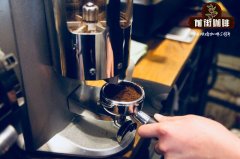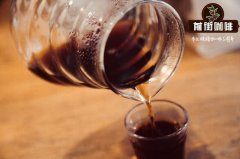Why is Nongfu Mountain Spring a little sweet? The effect of good water quality on coffee brewing?

Professional coffee knowledge exchange more coffee bean information please follow the coffee workshop (Wechat official account cafe_style)
Water, there are tap water, sea water, lake water and all kinds of mineral water, pure water. So what kind of water is suitable for making coffee and tea with so many kinds of water? What effect does it have on coffee? How big is the impact?
Let's start with the "a little sweet" widely read Nongfu Spring, this porter from Changbai Mountain, from Qiandao Lake. They all carry water, but they can be moved from Qiandao Lake and Changbai Mountain, and the coffee has a different flavor. There are many kisses who have just started to use water purification equipment (pure water machine), and the said water feels a little sweet to drink.
I believe that many friends, like editors, have been brainwashed by a well-known bottled water advertisement. So that when it comes to mineral water, the slogan "Nongfu Spring is a little sweet" is as unforgettable as first love.
Is that so? Why?
Although there are different opinions, it is believed that most people have the experience of drinking water sweet. So the question is, why does pure water taste a little sweet?
If you go to Baidu, there are really a thousand Hamlets in the eyes of a thousand people. Some academic emperors say that because there are trace minerals in the water, they can produce sweetness; some conspiracy theorists say that pure water manufacturers secretly added "ingredients"; some charlatans say that your blood sugar may be too high; and the more resourceful Xiaoming says that it is because you are too thirsty and hallucinating. Although it all sounds reasonable, apart from the final "hallucination theory", there is no way to explain why purified water may be a little sweet for healthy normal people to drink.
The original water has changed your sense of taste
In fact, the water treated by the pure water machine (built-in reverse osmosis membrane) will not have any taste, it should be tasteless to be exact.
Many consumers think that the treated water has a "sweet" taste, in fact, it should be that the original drinking water contains too many impurities, taste or peculiar smell, for a long time, affecting the taste buds to accurately judge the taste of water.
In this case, the drinking water suddenly becomes much cleaner, this contrast is the fundamental reason why you feel that the water has a sweet taste, the reason is that simple.
Second, the feeling of "sweet" is taken advantage of by unscrupulous manufacturers (merchants).
It is unreasonable for some manufacturers to advertise that their own water purification equipment can make the effluent sweet.
The working principle of the filter element of the whole water purification equipment is physical filtration, and the water purification equipment itself does not have any technical measures to make the water sweet, and there is no need to do so.
Some manufacturers (merchants) just take advantage of the differences caused by people's temporary inaccuracy in the taste buds to carry out exaggerated propaganda, do not believe it.
At the same time, we can also see that brands with strength in the market will not say so.
Now let's move on to part two, the impact of water quality on coffee:
Let's extract the two concepts from a profound and simple point.
The first is TDS, total dissolved solids (total dissolved solids) is a term for water quality engineering and environmental science. It used to be called total salinity. Refers to the total amount of dissolved components in water, including the total amount of various ions, molecules and compounds dissolved in water, excluding suspended solids and dissolved gases.
It is simply understood as: what proportion of other substances are dissolved in water? these substances can be salt or sugar. Note that it is "dissolved" and the suspended matter does not count.
There is a standard in the gold cup extraction theory of the coffee world (above). The coffee poured into this table is not necessarily good coffee + and if you want to brew good coffee, all kinds of data have to be rushed into this table.
So we can't define and judge a cup of coffee from the TDS index alone, because you can dissolve 150mg of salt or 150mg of sugar per liter of water, and the taste is very different, so it's conceivable that you need to analyze the detailed composition of the soluble substance behind the TDS standard value.
Next, let's talk about the second (and last, don't yawn) academic term: hardness.
The expression of hardness has not been unified, but there are two widely used methods in our country: one is to convert the measured calcium and magnesium into the mass of CaO, that is, the milligrams of CaO per liter of water, in mg? The other is measured in degrees: 1 unit of hardness means that 1 million parts of water contain 1 part of CaO (that is, 1 part of 10mgCaO per liter of water), 1 °= 10ppmCaO. The expression of this hardness is called German degree (German calculation is used in our country)
The total concentration of calcium and magnesium ions in water, when the concentration is low, soft water, on the contrary, the higher concentration is called hard water. For example, the tap water or groundwater in Japan is almost all soft water, compared with Europe and the United States and other places are mostly hard water. The water is hard in the north of China and soft in the south. There is no definite answer as to which is more suitable for brewing coffee, hard water or soft water, but the mineral content in the water does affect the taste of the water.
Generally speaking, water with too much or too little minerals is considered to be unbalanced water quality. It is assumed that the high content of calcium and magnesium ions will hinder the extraction of caffeine, high-quality tannic acid and other main ingredients of coffee. On the other hand, for example, the higher hardness of water quality, its effect will also be directly reflected in the bitterness of coffee.
Important Notice :
前街咖啡 FrontStreet Coffee has moved to new addredd:
FrontStreet Coffee Address: 315,Donghua East Road,GuangZhou
Tel:020 38364473
- Prev

What are the factors that affect espresso? How would you like your espresso?
Professional coffee knowledge exchange more coffee bean information Please pay attention to the coffee workshop (Wechat official account cafe_style) the taste of espresso mainly depends on coffee concentrate, so coffee concentrate occupies a very important position. The taste of coffee is affected by the amount of powder, degree of grinding, amount of extraction, extraction time and temperature. Powder quantity: according to the characteristics of coffee beans, choose the right powder.
- Next

How about Nepalese coffee? Taste and flavor of Nepalese coffee beans.
Professional coffee knowledge exchange more coffee bean information Please follow the coffee workshop (Wechat official account cafe_style) Santa Lama) in order to enable Nepalese to have a stable income to lift themselves out of poverty, they have gone to Japan to study coffee expertise and receive training. After returning to his hometown, he set up Nepal's first coffee company, Royal E.
Related
- Beginners will see the "Coffee pull flower" guide!
- What is the difference between ice blog purified milk and ordinary milk coffee?
- Why is the Philippines the largest producer of crops in Liberia?
- For coffee extraction, should the fine powder be retained?
- How does extracted espresso fill pressed powder? How much strength does it take to press the powder?
- How to make jasmine cold extract coffee? Is the jasmine + latte good?
- Will this little toy really make the coffee taste better? How does Lily Drip affect coffee extraction?
- Will the action of slapping the filter cup also affect coffee extraction?
- What's the difference between powder-to-water ratio and powder-to-liquid ratio?
- What is the Ethiopian local species? What does it have to do with Heirloom native species?

